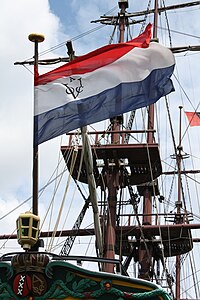പബ്ലിക്ക് കമ്പനി
പൊതുവേ ഓഹരി പങ്കാളിത്തത്തിലൂടെ ഉടമസ്ഥാവകാശം സംഘടിപ്പിക്കുന്ന ഒരു പൊതു കമ്പനി, പൊതുവിൽ വ്യാപാരം നടത്തുന്ന കമ്പനി, പൊതുവായി കൈവശം വച്ചിരിക്കുന്ന കമ്പനി, പൊതുവായി ലിസ്റ്റുചെയ്ത കമ്പനി, അല്ലെങ്കിൽ പബ്ലിക് ലിമിറ്റഡ് കമ്പനി എന്നിവയെയാണ് പബ്ലിക്ക് കമ്പനി എന്നു പറയുന്നത്. പബ്ലിക്ക് കമ്പനികൾ സ്റ്റോക്ക് എക്സ്ചേഞ്ചിലോ അല്ലെങ്കിൽ കൗണ്ടർ മാർക്കറ്റുകളിലോ സ്വതന്ത്രമായി ട്രേഡ് ചെയ്യാൻ ഉദ്ദേശിച്ചുള്ളതാണ്. ഒരു പൊതു കമ്പനിയെ സ്റ്റോക്ക് എക്സ്ചേഞ്ചിൽ (ലിസ്റ്റുചെയ്ത കമ്പനി) ലിസ്റ്റുചെയ്യാൻ കഴിയും, അത് ഷെയറുകളുടെ വ്യാപാരം സുഗമമാക്കുന്നു, പൊതുകമ്പനി അല്ലെങ്കിൽ ലിസ്റ്റ് ചെയാൻ സാധിക്കില്ല (ലിസ്റ്റുചെയ്യാത്ത പൊതു കമ്പനി). ചില അധികാരപരിധിയിൽ, ഒരു നിശ്ചിത വലിപ്പത്തിലുള്ള പൊതു കമ്പനികളെ ഒരു എക്സ്ചേഞ്ചിൽ ലിസ്റ്റുചെയ്യണം.

പ്രത്യേക കമ്പനികളുടെ നിയമവ്യവസ്ഥകൾക്കകത്താണ് പൊതു കമ്പനികൾ രൂപീകരിക്കുന്നത്, അതിനാൽ അവർ താമസിക്കുന്ന പോളിറ്റിയിൽ(polity) വ്യത്യസ്തവും വേറിട്ടതുമായ അസോസിയേഷനുകളും ഔദ്യോഗിക പദവികളും ഉണ്ട്. അമേരിക്കൻ ഐക്യനാടുകളിൽ, ഉദാഹരണത്തിന്, ഒരു പൊതു കമ്പനി സാധാരണയായി ഒരു തരം കോർപ്പറേഷനാണ് (ഒരു കോർപ്പറേഷൻ ഒരു പൊതു കമ്പനിയാകേണ്ടതില്ല), ഫ്രാൻസിൽ ഇത് സാധാരണയായി ഒരു “സൊസൈറ്റി അനോണിം” (എസ്എ) ആണ്, ബ്രിട്ടനിൽ ഒരു പബ്ലിക് ലിമിറ്റഡ് കമ്പനി ( plc), ജർമ്മനിയിൽ ഇത് ഒരു അക്റ്റിൻജെസെൽചാഫ്റ്റ്(Aktiengesellschaft)ആണ്(AG). ഒരു പൊതു കമ്പനിയുടെ പൊതുവായ ആശയം സമാനമായിരിക്കാമെങ്കിലും, വ്യത്യാസങ്ങൾ അർത്ഥവത്താകുന്നു, മാത്രമല്ല വ്യവസായത്തെയും വ്യാപാരത്തെയും സംബന്ധിച്ച അന്താരാഷ്ട്ര നിയമ തർക്കങ്ങളുടെ കാതലാണ്.
ചരിത്രം
തിരുത്തുകആധുനിക കാലഘട്ടത്തിന്റെ തുടക്കത്തിൽ ഡച്ചുകാർ നിരവധി സാമ്പത്തിക ഉപകരണങ്ങൾ വികസിപ്പിക്കുകയും ആധുനിക സാമ്പത്തിക വ്യവസ്ഥയ്ക്ക് അടിത്തറയിടാൻ സഹായിക്കുകയും ചെയ്തു. ഡച്ച് ഈസ്റ്റ് ഇന്ത്യാ കമ്പനി (വിഒസി) പൊതുജനങ്ങൾക്ക് ബോണ്ടുകളും സ്റ്റോക്ക് ഷെയറുകളും വിതരണം ചെയ്ത ചരിത്രത്തിലെ ആദ്യത്തെ കമ്പനിയായി.[11][12]മറ്റൊരു വിധത്തിൽ പറഞ്ഞാൽ, വിഒസി ഔദ്യോഗികമായി പരസ്യമായി വ്യാപാരം നടത്തുന്ന ആദ്യത്തെ കമ്പനിയാണ്[13], കാരണം ഇത് ഒരു ഔദ്യോഗിക സ്റ്റോക്ക് എക്സ്ചേഞ്ചിൽ യഥാർത്ഥത്തിൽ ലിസ്റ്റുചെയ്ത ആദ്യത്തെ കമ്പനിയാണ്. കൈമാറ്റം ചെയ്യാവുന്ന ആദ്യത്തെ സർക്കാർ ബോണ്ടുകൾ ഉപയോഗിച്ച് ഇറ്റാലിയൻ നഗരങ്ങൾ നിർമ്മിക്കുമ്പോൾ, സമ്പൂർണ്ണ മൂലധന വിപണി ഉൽപാദിപ്പിക്കുന്നതിന് ആവശ്യമായ മറ്റ് ഘടകങ്ങൾ അവർ വികസിപ്പിച്ചില്ല.
അവലംബം
തിരുത്തുക- ↑ Funnell, Warwick; Robertson, Jeffrey: Accounting by the First Public Company: The Pursuit of Supremacy. (Routledge, 2013, ISBN 0415716179)
- ↑ Brooks, John: The Fluctuation: The Little Crash in '62, in Business Adventures: Twelve Classic Tales from the World of Wall Street. (New York: Weybright & Talley, 1968)
- ↑ Shiller, Robert (2011). Economics 252, Financial Markets: Lecture 4 – Portfolio Diversification and Supporting Financial Institutions (Open Yale Courses). [Transcript]
- ↑ Petram, Lodewijk: The World's First Stock Exchange: How the Amsterdam Market for Dutch East India Company Shares Became a Modern Securities Market, 1602–1700. Translated from the Dutch by Lynne Richards. (Columbia University Press, 2014, pp. 304)
- ↑ Macaulay, Catherine R. (2015). “Capitalism's renaissance? The potential of repositioning the financial 'meta-economy'”. (Futures, Volume 68, April 2015, p. 5–18)
- ↑ Taylor, Bryan (6 Nov 2013). "The Rise and Fall of the Largest Corporation in History". BusinessInsider.com. Retrieved 18 August 2017.
- ↑ "World's oldest share". The World's Oldest Share. Retrieved 8 August 2017.
- ↑ "Dutch history student finds world's oldest share". Guinness World Records Limited 2014. 10 Sep 2010. Retrieved 8 August 2017.
- ↑ "Student finds oldest Dutch share". Radio Netherlands Worldwide. 10 Sep 2010. Archived from the original on 8 August 2014. Retrieved 8 August 2017.
- ↑ Dunkley, Jamie (11 Sep 2010). "Dutch student finds world's oldest share certificate". Telegraph.co.uk. Retrieved 8 August 2017.
- ↑ Tracy, James D. (1985). A Financial Revolution in the Habsburg Netherlands: Renten and Renteniers in the County of Holland, 1515–1565. (University of California Press, 300 pp)
- ↑ Sylla, Richard (2015). "Financial Development, Corporations, and Inequality". (BHC-EBHA Meeting). As Richard Sylla (2015) notes, "In modern history, several nations had what some of us call financial revolutions.... The first was the Dutch Republic four centuries ago."
- ↑ Kaiser, Kevin; Young, S. David (2013): The Blue Line Imperative: What Managing for Value Really Means. (Jossey-Bass, 2013, ISBN 978-1118510889), p. 26. As Kevin Kaiser & David Young (2013) explain, "There are other claimants to the title of first public company, including a twelfth-century water mill in France and a thirteenth-century company intended to control the English wool trade, Staple of London. Its shares, however, and the manner in which those shares were traded, did not truly allow public ownership by anyone who happened to be able to afford a share. The arrival of VOC shares was therefore momentous, because as Fernand Braudel pointed out, it opened up the ownership of companies and the ideas they generated, beyond the ranks of the aristocracy and the very rich, so that everyone could finally participate in the speculative freedom of transactions."